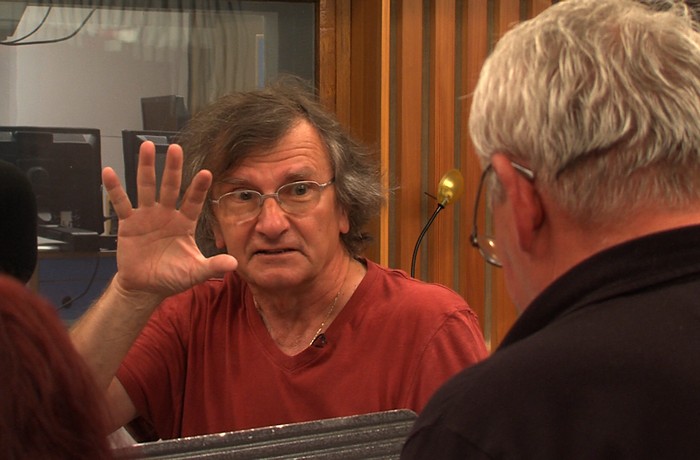
The project that he has signed together with Miroslav Buriánek, is at the same time an original homage to this radio director who, ten years ago, opened to Štětina a crack into the world of radio-fiction in the Plzeň studio.
The basis of the installation is a film record, a kind of a “making-of” the radio adaptation of Jiří Kolář’s poetry collection Instructions for use (written 1965, first edition 1969) with five members of the theatre company KLAS. The viewer follows the making of the radio version in a setting dominated by a large projection screen and objects intended for sitting, whose geometrical base is given by Buriánek’s directorial notes on Kolář’s texts. The directorial action itself, conducting actors, rehearsing alternative recitations of different Kolář poems, explanatory comments on interpretation (either reacting immediately to the situation in the studio, or complemented ex post as an independent sound layer based on directorial notes) and the radio studio setting itself, all this develops a strong dramatic line, thanks to which one almost forgets about the simple fact that one is denied to the result, i.e. one never hears the final wording of the texts as they could have been heard in a radio broadcast.
The film, which lasts over two hours, and the installation reflect the hidden background of radio work, inaccessible to listeners. In a fascinating way they dramatize the construction and the making of a radio programme, fulfilling at the same time the intention of Kolář’s calls to action in a manner completely different from the usual explications of his attempt at “de-static” poetry – that is, to move the reader forward so as to realise the action described in the poem. In fact, the very search for adequate interpretation of the original text turns out to be the action.
The exhibition Instructions for use of Jiří Kolář is Štětina’s project as the Jindřich Chalupecký Award winner, produced by PLATO and the Jindřich Chalupecký Society.
Marek Pokorný
Roman Štětina (*1986) studied in the studio of Tomáš Vaněk at the Prague Academy of Fine Arts from 2009–2015. His intermedia interest in radio as an institution has been reflected in a number of complex projects dealing with the question how image, sound, action and physical (or imagined, respectively) space touch, deny, exclude and complement each other in different situations. He won the Jindřich Chalupecký Award in 2014.
Miroslav Buriánek (*1951) is one of the most prominent Czech radio directors. After graduation from the Prague Theatre Academy of Performing Arts his career was connected, between 1978 and 2015, with the radio studio in Plzeň for which he created hundreds of reports, radio documentaries and dramatizations of literary texts.
